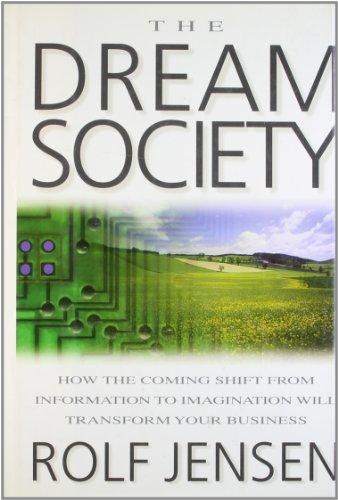The Dream Society Summary

4 min read ⌚
 How the Coming Shift from Information to Imagination Will Transform Your Business
How the Coming Shift from Information to Imagination Will Transform Your Business
If you’re still adapting to the information age, you better stop doing that right now. Because, the Information Society is a last year’s business.
Rolf Jensen introduces the next phase of human development: “The Dream Society.”
About Rolf Jensen
Rolf Jensen is a noted futurist and lecturer, the Director of “The Copenhagen Institute for Future Studies.” He has advised over 100 leading government agencies and leading companies on matters such as global economy and experience economy.
is a noted futurist and lecturer, the Director of “The Copenhagen Institute for Future Studies.” He has advised over 100 leading government agencies and leading companies on matters such as global economy and experience economy.
In addition to “The Dream Society,” he has also co-authored (with Mika Aaltonen) “The Renaissance Society.”
“The Dream Society Summary”
“The anthropologists,” wrote fantasy author Terry Pratchett in his 2002 book “The Science of Discworld II: The Globe”, “got it wrong when they named our species Homo sapiens (‘wise man’). In any case it’s an arrogant and bigheaded thing to say, wisdom being one of our least evident features. In reality, we are Pan narrans, the storytelling chimpanzee.”
Rolf Jensen concurs: storytelling is undoubtedly both our past and our innermost nature. But, in “The Dream Society” he also adds: it’s our future as well.
Our present world is ruled by numbers and facts. No wonder they call it the Information Age. However, that world is already over in Western affluent societies. Its successor: the Dream Society.
Based on humans’ inherent need to tell and hear stories, the Dream Society will be a society based exclusively on storytelling and emotions. And you can already see how it has started surpassing the Information society.
A good example is the Danish egg business. Almost 50% of the eggs sold in Denmark are from free-range hens; namely, hens living not in captivity, but in the sun, under the bright blue sky. These, however, are much more expensive (20%) than other eggs. And taste exactly the same.
So, why do people buy them?
Because they have a better story.
And that’s exactly what every large company has started selling since recently. In the opinion of Rolf Jensen, in the Dream Society, these stories will be sold in six different profiles, and at six different markets.
Sports stories will dominate the Adventure Market; the Market of Togetherness, Friendship, and Love will be all about stories which bring people closer. The Market of Care has already shifted from scientific to alternative medicine because of the stories the latter one sells.
The Who-Am-I Market is the reason why you buy certain clothes or prefer certain names. The Market for Peace of Mind is where storytellers will try to give people some security in a dynamic age such as ours. Finally, the Market of Convictions is where products will be bought by customers because the companies which produce them put some cause first (say, global warming) and their profit second.
All of this will result in a new type of corporations and an even newer type of communities.
Namely, corporations won’t be hierarchical structures anymore, but tribe-like organizations aiming to unite not individuals with certain types of skills, but communities with common values. And, thanks to the Internet, these communities are already happening all around us, and may even supplant the concept of nations.
Welcome the new age: the one of the Cybernations.
Key Lessons from “The Dream Society”
1. Storytelling Is Both the Past and the Future of Humanity
2. You Won’t Buy Products Anymore – You’ll Buy Their Stories
3. Companies Will Be Organized as Tribes And Nations as Cybernations
Storytelling Is Both the Past and the Future of Humanity
Stories are capable of inspiring, influencing and persuading. They have done exactly that for millennia. However, the Information Age introduced facts and data. Rolf Jensen thinks that this worked – but only for a short period of time.
The future is, once again, reserved for the stories. And our present is the best evidence.
You Won’t Buy Products Anymore – You’ll Buy Their Stories
The days of the information society – customers buying cheaper better-quality products – are numbered. Affluent societies have made this possible. In most of them, people have started buying more expensive less convenient products merely because the companies who produce them share their convictions or beliefs.
That’s why the Danish buy more expensive eggs – simply because they come from free-range (and not caged) hens.
Companies Will Be Organized as Tribes and Nations as Cybernations
Old-school hierarchy-based companies will not be able to last long in the Dream Society. And the same goes for nations as well. Because of the Internet, for the first time in history, people are able to unite because of something deeper than a national belonging – common belief system.
These Internet communities are what Jensen calls Cybernations. And from these Cybernations, companies will rise, organized much more like egalitarian tribes than anything else.
After relearning from hunter-gatherers how to unleash the power of stories, modern people will also have to relearn how to live in supranational tribes.
Like this summary? We’d Like to invite you to download our free 12 min app, for more amazing summaries and audiobooks.
“The Dream Society” Quotes
The market for dreams would gradually exceed the market for information-based reality. Share on X The hunter-gatherers may teach modern-day companies a lesson: respect for myth and stories. Share on X The story is the product — the rest is just production. Share on X The story most frequently infused into modern products is the myth of rural romanticism. Share on X The battle of the 21st century will be fought on a microfront where the bone of contention is the individual’s attention. Share on X







